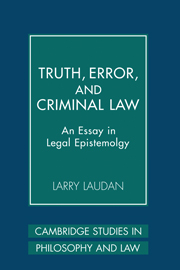Book contents
- Frontmatter
- Contents
- Preface
- Abbreviations and Acronyms Used
- 1 Thinking about Error in the Law
- PART I THE DISTRIBUTION OF ERROR
- PART II FLAWED RULES OF EVIDENCE AND PROCEDURE
- 5 Evaluating Evidence and Procedures
- 6 Silent Defendants, Silent Witnesses, and Lobotomized Jurors
- 7 Confessions, Poison Fruit, and Other Exclusions
- 8 Double Jeopardy and False Acquittals: Letting Felons and Judges off the Hook?
- 9 Dubious Motives for Flawed Rules: The Clash between Values
- Index
7 - Confessions, Poison Fruit, and Other Exclusions
Published online by Cambridge University Press: 05 June 2012
- Frontmatter
- Contents
- Preface
- Abbreviations and Acronyms Used
- 1 Thinking about Error in the Law
- PART I THE DISTRIBUTION OF ERROR
- PART II FLAWED RULES OF EVIDENCE AND PROCEDURE
- 5 Evaluating Evidence and Procedures
- 6 Silent Defendants, Silent Witnesses, and Lobotomized Jurors
- 7 Confessions, Poison Fruit, and Other Exclusions
- 8 Double Jeopardy and False Acquittals: Letting Felons and Judges off the Hook?
- 9 Dubious Motives for Flawed Rules: The Clash between Values
- Index
Summary
Men are not to be exploited for the information necessary to condemn them before the law … the state which proposes to convict and punish an individual [should] produce the evidence against him by the independent labor of its officers.
– U.S. Supreme Court (1961)Admissions of guilt are more than “desirable,” … they are essential to society's compelling interest in finding, convicting and punishing those who violate the law.
– U.S. Supreme Court (1986)Evidence is the basis of justice: to exclude evidence is to exclude justice.
– Jeremy Bentham (1827)The Tortured Logic of the Admission of Confessions
Our focus in the last chapter was on the Silent Defendant. Here, we look at the case of the defendant who wasn't silent but later wishes he had been. In short, confessions – especially retracted ones – will be the center of attention. Numerous empirical studies make it clear that confessions play a significant role in American criminal procedure. Making allowances for discrepancies between various jurisdictions, it seems a fair summary of that research to say that more than a third of resolved criminal cases involve a confession from the accused. Given their frequency, no study of the epistemology of the law would be even modestly adequate without a discussion of the reliability of such self-incriminatory activity.
Unhappily, few parts of the contemporary law of evidence are more epistemically challenged than the rules governing the admissibility of confessions.
- Type
- Chapter
- Information
- Truth, Error, and Criminal LawAn Essay in Legal Epistemology, pp. 171 - 193Publisher: Cambridge University PressPrint publication year: 2006

